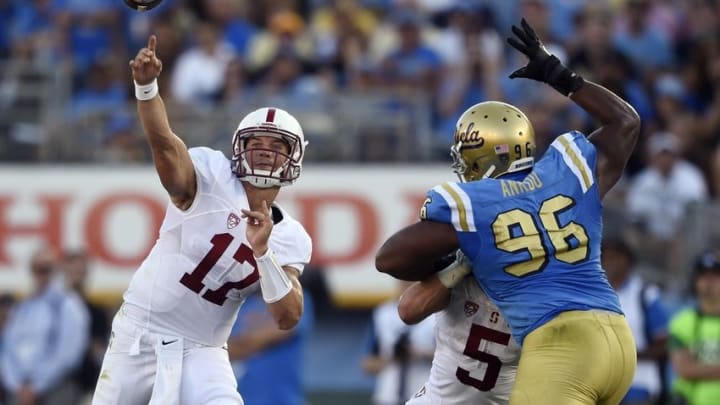UCLA vs Stanford recap: 3 things we learned

What are some of the takeaways from Saturday’s Pac-12 matchup between UCLA and Stanford?
Stanford and UCLA played one of the slowest paced games fans will see in the 2016 college football season. Every possession mattered, with both teams trying to grind out points and any first down they could receive. When the game clock hit triple zeroes, though, the Cardinal would take the lead late with a touchdown and eventually win 22-13.
Nobody could score
Stanford vs. UCLA was a slow, defensive-minded game. The Cardinal took it slow throughout, hitting three field goals and rarely pulling off an eye-popping play. It could be due to the pro-style offense they run, which may not be the most fun thing to watch.
UCLA had their fair share of opportunities on offense, but numerous dropped passes hurt drives down the field. It cost them an opportunity within the Stanford 35, leading to a turnover on downs. Quarterback Josh Rosen didn’t put up great stats, but he performed effectively, positioning his feet correctly and making the proper reads for most of his throws. It’s not always there, but the flashes of this show he could work in the NFL.
Quiet but decent night from McCaffrey
Christian McCaffrey’s Saturday night performance probably won’t scream “Heisman Trophy” because his longest run went for 13 yards. He didn’t score a touchdown, and provided no plays where you were wowed by his skills.
However, the junior running back still racked up 134 yards on 25 carries for an average of 5.4 yards per carry. Not too shabby, right? It was difficult to notice him do anything, except for a few wildcat plays, which didn’t do much.
Putting up these stats on a “quiet” night for McCaffrey may show just how talented he is. He’ll really be put to the rest next Saturday, though, against Washington.
Targeting is a broken rule
A story throughout Saturday focused on the targeting penalty. It popped up across college football, with calls either not being made properly or not at all. This rule is supposed to protect defenseless players from being hit helmet to helmet, but often gets missed by the referees.
During the second quarter of this game, Stanford wide receiver Francis Owusu caught a pass but clearly got hit helmet to helmet, assisting in him losing the football. Multiple replays showed this, and even the replay booth took an extra look. However, no targeting call got handed out to the UCLA defender.
Next: Ranking The 25 Best Rivalries In College Football
It’s difficult to understand how that doesn’t get called, but yet, something like this does. Targeting is becoming like the ongoing “what is a catch?” debate. A more descriptive wording in the rule book may be needed, so referees make the call (or don’t) in the appropriate situations. That’s up to the NCAA to decide, which isn’t a guarantee that it will get done.